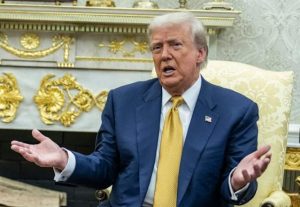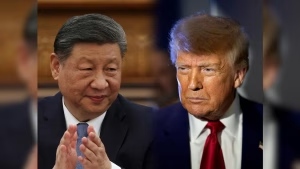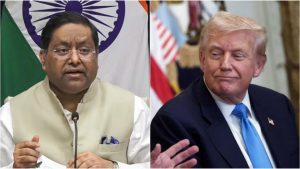Washington D.C. – President Donald Trump addressed mounting questions about why India singled out for extra sanctions during a White House press conference Thursday, hours after implementing tariffs that brought Indian import duties to 50 percent. The unprecedented move has sparked international debate about fairness in sanctions enforcement, particularly given that other nations continue purchasing Russian oil without facing similar penalties.
Trump’s response to inquiries about why India singled out for extra sanctions was both defensive and forward-looking, suggesting this represents merely the beginning of a broader sanctions campaign. The President indicated that additional countries could face similar measures, though the timeline and specific targets remain unclear.
Presidential Response to Discrimination Allegations

When pressed about why India singled out for extra sanctions while countries like China continue Russian oil purchases without equivalent penalties, Trump’s response was characteristically direct yet cryptic. “It’s only been 8 hours. So let’s see what happens. You’re going to see a lot more…You’re going to see so much secondary sanctions,” the President declared.
This statement suggests the administration’s strategy involves a phased approach to sanctions implementation rather than simultaneous action against all Russian oil purchasers. However, critics argue this selective enforcement raises questions about why India singled out for extra sanctions when larger economies engage in similar activities.
The President’s comments indicate that the current India-focused measures represent an opening salvo rather than a comprehensive sanctions strategy, though specific details about future targets remain undisclosed.
China Question Looms Large in Sanctions Strategy

Reporters specifically challenged Trump about China’s continued Russian oil purchases, asking whether Beijing would face similar treatment. His response regarding why India singled out for extra sanctions while China receives different treatment was notably noncommittal: “Could happen. Depends on how we do. Could happen.”
This ambiguous stance on China highlights the complexity surrounding why India singled out for extra sanctions enforcement. China represents the world’s largest purchaser of Russian and Iranian oil, making any sanctions against Beijing potentially more economically disruptive than measures targeting India.
The differential treatment has prompted questions about whether economic considerations influence why India singled out for extra sanctions decisions, with some suggesting smaller economies face easier targeting than major global powers.
Bipartisan Criticism Emerges from Republican Leadership


Republican leader Nikki Haley publicly criticized the administration’s approach, specifically addressing why India singled out for extra sanctions while China receives more lenient treatment. Her comments on social media platform X highlighted the apparent inconsistency in sanctions application.
“India should not be buying oil from Russia. But China, an adversary and the number one buyer of Russian and Iranian oil, got a 90-day tariff pause. Don’t give China a pass and burn a relationship with a strong ally like India,” Haley wrote.
Her criticism directly challenges the logic behind why India singled out for extra sanctions, arguing that strategic alliance considerations should influence enforcement priorities. Haley’s intervention represents rare intra-party criticism of Trump’s trade policies.
Executive Order Doubles Tariff Impact on Indian Exports
The Wednesday executive order addressing why India singled out for extra sanctions imposed an additional 25 percent tariff on all Indian goods entering the United States, supplementing the 25 percent duties announced the previous week. This brings total tariffs on Indian imports to 50 percent.
These measures, effective August 27, create significant competitive disadvantages for Indian exporters compared to countries like Bangladesh, Indonesia, and Vietnam, which face tariffs between 19 and 20 percent. The disparity further emphasizes questions about why India singled out for extra sanctions while regional competitors avoid similar penalties.
The executive order cited India’s purchase of energy and military equipment from Russia as justification for the sanctions, though critics note similar purchases by other nations that escape equivalent treatment.
India’s Strong Condemnation and Counter-Arguments


New Delhi responded forcefully to questions about why India singled out for extra sanctions, condemning the measures as “unfair, unjustified and unreasonable.” Indian officials argued that the United States and European Union unfairly target India for activities that multiple countries engage in regularly.
India’s response to why India singled out for extra sanctions emphasizes the discriminatory nature of enforcement, pointing out that several other nations engage in similar Russian trade without facing equivalent penalties. This argument challenges the administration’s stated rationale for selective sanctions application.
Strategic Implications and Future Sanctions Policy
The controversy over why India singled out for extra sanctions reflects broader challenges in implementing comprehensive sanctions regimes. The administration faces difficult choices between maintaining alliance relationships and enforcing consistent sanctions policies across all Russian oil purchasers.
Trump’s promise of additional secondary sanctions suggests that the current focus on why India singled out for extra sanctions represents tactical rather than strategic discrimination. However, the effectiveness of phased implementation versus comprehensive enforcement remains debatable among policy experts.

